Unit 1
The Indian Contract Act, 1872
The Indian Contract Act, 1872 defines the term “Contract” under its section 2 (h) as “An agreement enforceable by law”.

The nature/essential/general principles elements of valid contract are-
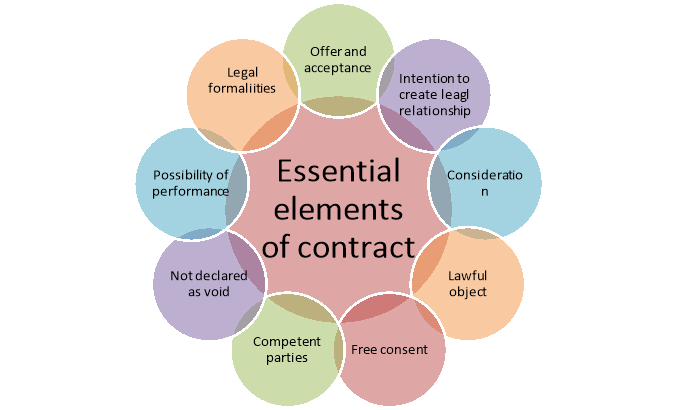
Figure1: Essential elements of valid contract
- Offer and its acceptance
According to section 2 (A) of the Indian Contract Act,1872 “When one person signifies to another his willingness to do or to abstain from doing anything, with a view to obtaining the assent of that other to such act or abstinence, he is said to make a proposal’’. The person who makes an offer is called ‘’Offeror’’ or ‘’Promisor’’ and the person to whom the offer has been made is called Offeree or Promisee. For example, Mr. A owns several cars. He enters into an agreement with Mr. B to sell one of his cars. He tell Mr. B, Will you buy my car at Rs. 2,00,000/- This is not a valid offer as Mr.A did not specify the car he is talking about. Here, the offer is ambigious.
According to section 2(b) of Indian Contract Act,1872, when a person to whom an proposal has been made, signifies his assent thereto. In the case of Lalman Shukla v Gauri Dutt (1913), the defendant’s boy went missing, accordingly, his servant-Plaintiff was sent to search for the boy, in the meantime a missing poster was released by the defendant, promising to pay a certain sum, to the person who finds the boy. The servant, unaware of such an offer succeeded to find the boy. Once he discovered that such an offer existed he asked for the consideration, but the same was denied. The court ruled in favour of the Defendant, by holding that Plaintiff was ignorant of offer and thus the performance of the promise does not amount to acceptance.
2. Free consent of both parties:
According to section 10 of the contract act, a contract is valid if it was entered into by free consent of the parties. Section 14 of the contract act defined free consent as consent not given under coercion, undue influence, fraud, misrepresentation and mistake. Chickam Amiraju v. Chickam Sheshamma In case, the Husband gives a threat that he will commit suicide if they did not execute a release deed in favour of his brother to his wife and son. The wife and son executed the release deed under the threat given by the husband. It was held that threat to commit suicide amounts to coercion under section 16 of the Act. Section 17 of the Act lays down the list of Act which amounts to fraud. There is the slightest difference between fraud and misrepresentation, in the first case the person making the statement does not believe that such statement is true and in later one, the person making such statement belives that such statement is true.
3. Mutual and lawful consideration for agreement
Section 2(d) of Indian Contract Act,1872 defines consideration as ‘’When, at the desire of the promisor, the promisee or any other person has done or abstained from doing, or does or abstains from doing, or promises to do or to abstain from doing, something, such act or abstinence or promise is called a consideration for the promise;’’ In Currie v Misa court defines consideration as ‘a valuable in sense of the law it may consist either some right, interest, profit or benefit accruing to one party, or some forbearance, detriment, loss or responsibility given, suffered or undertaken by the other part. If the proposal is not supported with any money such proposal will be nudum pactum (a bare promise) and is not enforceable by law.
4. Intention to create legal relationship
Intention to create a legal relationship is one of the most fundamental aspects of the law. It is defined as the intention to enter a legally binding agreement or contract, it implies that the parties acknowledge and accept legal consequence in case of a breach of a contract. Intention to create legal relations consists of readiness of a party to accept the legal consequences of having entered into an agreement. For example, A agrees to meet his friend B at 9:00 p.m. It is the moral and social duty of A to meet this agreement and it does not create any legal obligation on B neither there is any legal relationship between A and B.
5. Parties should be competent to contract
According Sec .11, every person is competent to contract who
- Is of the age of majority according to the law to which he's subject
- Is of sound mind
- Is not qualified from contracting by any law to which he's subject.
Thus Sec. 11 declares following persons to be incompetent to contract:
- Minors
- Persons of unsound mind
- Persons disqualified by any law to which they're subject.
In Mohori Bibee v. Damodar Ghose, In this case, Damodar Ghose the defendant was a minor and the sole owner of his property. His legally appointed guardian was his mother. a moneylender Mr Brahmo Dutt, through his agent Kedar Nath, lent the defendant at 12% interest per year a sum of Rs 20,000. By way of mortgaging the property, the loan was taken by the defendant. On the day on which the deal was made, Damodar Ghose's mother notified the appellant that Damodar was a minor, and anyone who enters an agreement with him would do so at his own risk. Kedar Nath claimed that Damodar Ghose had lied about minority on the date of the execution of the deed.
6. Object should be lawful
According to section 10, consideration and object of the contract should be lawful and is an essential element of a contract. Accordingly, Section 23 defines unlawful consideration. Unlawful consideration and object is one which is either,
- Forbidden by law; or
- Is of such a nature, that if permitted, then it would defeat the provisions of law; or
- The purpose of the contract is fraudulent;or
- Involves or implies giving injury or damage to someone or to someone’s property; or
- The court considers it as immoral or against public policy.
For example, if A forces B to sign a contract for buying a car from C by kidnapping C's daughter. This is not a lawful object. Hence, the contract will be void.
7. Contract shouldn't are declared as void under Contract Act or the other law
Apart from conditions u/s 10, contract act specifically declared a few classes of contract as void. Section 26 to 30 deals with such contracts. There are those contacts which have been expressly declared void by the Contract Act.
- Agreements restricting a marriage (section 26)
- Agreements restricting trade (section 27)
- Agreements in restraint of proceedings (section 28)
- Agreements void due to uncertainty (section 29)
- Agreement of wager are void(section 30)
In the day-to-day life of every person, Contracts play a very important role. Contracts or agreements between various parties are governed by the Indian Contract Act. Above-given conditions must be fulfilled by the parties for the formation of a contract. Herefore it is important to have the all essential elements which are mentioned above in a contract. Only if there are all the main elements in an agreement then it would legally constitute a valid contract.
8. Possibility of performance:
Agreement must be capable of performance. If agreement is not capable of performance, it is void. In order to make an agreement valid, the terms of the agreement must be clear, certain and capable of performance. An agreement to do an impossible act is void. For example, A enters into an agreement with B to bring back C to life who is already dead. This agreement is void.
9. Legal Formalities:
According to Indian Contract Act1872, a contract can be both in oral and in writing. Contract involving movable property can be made orally but contract involving immovable property must always be in writing. However, it is advisable that the contract must always be in writing because it will be easier to prove in the court if any dispute arises between the parties in future. Contract must be signed and attested by witness and registered if required by the law. For example, X entered into an oral agreement with Y to sell his bike. This is a valid agreement.
KEY TAKEAWAYS
- THE INDIAN CONTRACT ACT, 1872 DEFINES THE TERM “CONTRACT” UNDER ITS SECTION 2 (h) AS “AN AGREEMENT ENFORCEABLE BY LAW”.
Meaning
The Indian Contract Act, 1872 defines the term “Contract” under its section 2 (h) as “An agreement enforceable by law”. In other words, we will say that a contract is anything that's an agreement and enforceable by the law of the land. This definition has two major elements in it viz – “agreement” and “enforceable by law”. So as to know a contract in the light of The Indian Contract Act, 1872 we need to define and explain these two pivots within the definition of a contract. For example, marriage contract, business contact etc.
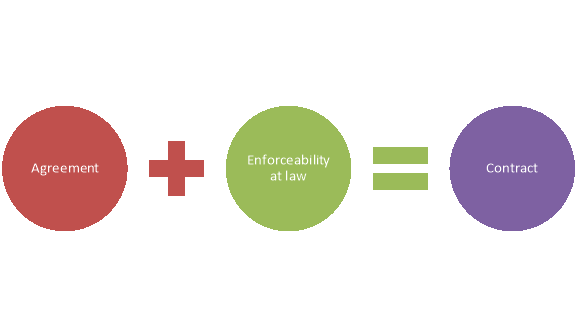
Figure: Concept of contract
There are some essential elements for valid contract without which the contract is void and not enforceable at law. The essential elements of valid contract provided under the Indian contract are-
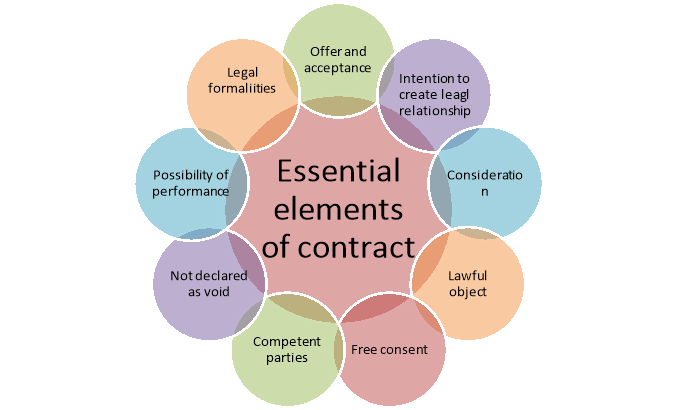
Figure1: Essential elements of valid contract
- Offer and its acceptance
According to section 2 (A) of the Indian Contract Act,1872 “When one person signifies to another his willingness to do or to abstain from doing anything, with a view to obtaining the assent of that other to such act or abstinence, he is said to make a proposal’’. The person who makes an offer is called ‘’Offeror’’ or ‘’Promisor’’ and the person to whom the offer has been made is called Offeree or Promisee. For example, Mr. A owns several cars. He enters into an agreement with Mr. B to sell one of his cars. He tell Mr. B, Will you buy my car at Rs. 2,00,000/- This is not a valid offer as Mr.A did not specify the car he is talking about. Here, the offer is ambigious.
According to section 2(b) of Indian Contract Act,1872, when a person to whom an proposal has been made, signifies his assent thereto. In the case of Lalman Shukla v Gauri Dutt (1913), the defendant’s boy went missing, accordingly, his servant-Plaintiff was sent to search for the boy, in the meantime a missing poster was released by the defendant, promising to pay a certain sum, to the person who finds the boy. The servant, unaware of such an offer succeeded to find the boy. Once he discovered that such an offer existed he asked for the consideration, but the same was denied. The court ruled in favour of the Defendant, by holding that Plaintiff was ignorant of offer and thus the performance of the promise does not amount to acceptance.
2. Free consent of both parties:
According to section 10 of the contract act, a contract is valid if it was entered into by free consent of the parties. Section 14 of the contract act defined free consent as consent not given under coercion, undue influence, fraud, misrepresentation and mistake. Chickam Amiraju v. Chickam Sheshamma In case, the Husband gives a threat that he will commit suicide if they did not execute a release deed in favour of his brother to his wife and son. The wife and son executed the release deed under the threat given by the husband. It was held that threat to commit suicide amounts to coercion under section 16 of the Act. Section 17 of the Act lays down the list of Act which amounts to fraud. There is the slightest difference between fraud and misrepresentation, in the first case the person making the statement does not believe that such statement is true and in later one, the person making such statement belives that such statement is true.
3. Mutual and lawful consideration for agreement
Section 2(d) of Indian Contract Act,1872 defines consideration as ‘’When, at the desire of the promisor, the promisee or any other person has done or abstained from doing, or does or abstains from doing, or promises to do or to abstain from doing, something, such act or abstinence or promise is called a consideration for the promise;’’ In Currie v Misa court defines consideration as ‘a valuable in sense of the law it may consist either some right, interest, profit or benefit accruing to one party, or some forbearance, detriment, loss or responsibility given, suffered or undertaken by the other part. If the proposal is not supported with any money such proposal will be nudum pactum (a bare promise) and is not enforceable by law.
4. Intention to create legal relationship
Intention to create a legal relationship is one of the most fundamental aspects of the law. It is defined as the intention to enter a legally binding agreement or contract, it implies that the parties acknowledge and accept legal consequence in case of a breach of a contract. Intention to create legal relations consists of readiness of a party to accept the legal consequences of having entered into an agreement. For example, A agrees to meet his friend B at 9:00 p.m. It is the moral and social duty of A to meet this agreement and it does not create any legal obligation on B neither there is any legal relationship between A and B.
5. Parties should be competent to contract
According Sec .11, every person is competent to contract who
- Is of the age of majority according to the law to which he's subject
- Is of sound mind
- Is not qualified from contracting by any law to which he's subject.
Thus Sec. 11 declares following persons to be incompetent to contract:
- Minors
- Persons of unsound mind
- Persons disqualified by any law to which they're subject.
In Mohori Bibee v. Damodar Ghose, In this case, Damodar Ghose the defendant was a minor and the sole owner of his property. His legally appointed guardian was his mother. a moneylender Mr Brahmo Dutt, through his agent Kedar Nath, lent the defendant at 12% interest per year a sum of Rs 20,000. By way of mortgaging the property, the loan was taken by the defendant. On the day on which the deal was made, Damodar Ghose's mother notified the appellant that Damodar was a minor, and anyone who enters an agreement with him would do so at his own risk. Kedar Nath claimed that Damodar Ghose had lied about minority on the date of the execution of the deed.
6. Object should be lawful
According to section 10, consideration and object of the contract should be lawful and is an essential element of a contract. Accordingly, Section 23 defines unlawful consideration. Unlawful consideration and object is one which is either,
- Forbidden by law; or
- Is of such a nature, that if permitted, then it would defeat the provisions of law; or
- The purpose of the contract is fraudulent;or
- Involves or implies giving injury or damage to someone or to someone’s property; or
- The court considers it as immoral or against public policy.
For example, if A forces B to sign a contract for buying a car from C by kidnapping C's daughter. This is not a lawful object. Hence, the contract will be void.
7. Contract shouldn't are declared as void under Contract Act or the other law
Apart from conditions u/s 10, contract act specifically declared a few classes of contract as void. Section 26 to 30 deals with such contracts. There are those contacts which have been expressly declared void by the Contract Act.
- Agreements restricting a marriage (section 26)
- Agreements restricting trade (section 27)
- Agreements in restraint of proceedings (section 28)
- Agreements void due to uncertainty (section 29)
- Agreement of wager are void(section 30)
In the day-to-day life of every person, Contracts play a very important role. Contracts or agreements between various parties are governed by the Indian Contract Act. Above-given conditions must be fulfilled by the parties for the formation of a contract. Herefore it is important to have the all essential elements which are mentioned above in a contract. Only if there are all the main elements in an agreement then it would legally constitute a valid contract.
8. Possibility of performance:
Agreement must be capable of performance. If agreement is not capable of performance, it is void. In order to make an agreement valid, the terms of the agreement must be clear, certain and capable of performance. An agreement to do an impossible act is void. For example, A enters into an agreement with B to bring back C to life who is already dead. This agreement is void.
9. Legal Formalities:
According to Indian Contract Act1872, a contract can be both in oral and in writing. Contract involving movable property can be made orally but contract involving immovable property must always be in writing. However, it is advisable that the contract must always be in writing because it will be easier to prove in the court if any dispute arises between the parties in future. Contract must be signed and attested by witness and registered if required by the law. For example, X entered into an oral agreement with Y to sell his bike. This is a valid agreement.
Consideration
When at the desire of the promisor, the promise or any other person has done or abstained from doing, or does or abstains from doing, or promises to do or to abstain from doing something, such act or abstinence or promise is called a consideration for the promise.
According to section 2(d) when at the desire of the promisor, the promisee or any other person:
- Has done or abstained from doing ,or [Past consideration]
- Does or abstains from doing, or [Present consideration]
- Promises to do or abstain from doing something [Future consideration] such act or abstinence or promise are called a consideration for the promise.
EXAMPLE: ‘P’ aggress to sell his car to ‘Q’ for Rs.50, 000 Here ‘Q’s Promise to pay Rs. 50, 000 is that the consideration for P’s promise and ‘P’s promise to sell the car is that the consideration for ‘Q’s promise.
Importance of consideration
Consideration explains why a party is entering a contract and what they get from being a part of the contract. A contract must include consideration for each party involved so as to be valid. Essentially, consideration is that the benefit a party gets for entering a contract. During a basic contract, if you pay money for an item at the store and receive the item, that's your consideration. So as to qualify as consideration, each party must change their position.
Consideration usually results from:
• A promise to do something you are not legally obligated to try and do
• A promise to not do something you're allowed to do.
KEY TAKEAWAYS
- CONTRACT HAS TWO MAJOR ELEMENTS IN IT VIZ – “AGREEMENT” AND “ENFORCEABLE BY LAW”. SO AS TO KNOW A CONTRACT IN THE LIGHT OF THE INDIAN CONTRACT ACT, 1872 WE NEED TO DEFINE AND EXPLAIN THESE TWO PIVOTS WITHIN THE DEFINITION OF A CONTRACT. FOR EXAMPLE, MARRIAGE CONTRACT, BUSINESS CONTACT ETC.
The rules regarding consideration are discussed below-
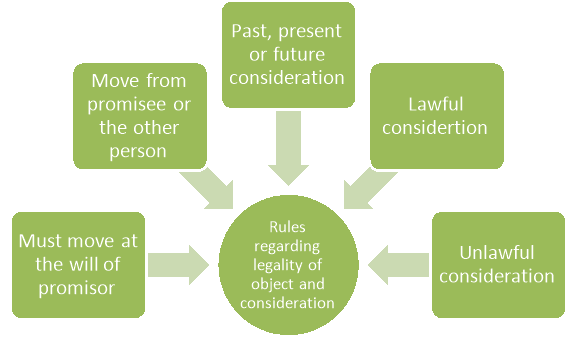
Figure: Rules regarding legality of object and consideration
- It must move at the will of the promisor:
It must be offered by the promisee at the will or request of the promisor. An act done at the will or request of the third party doesn't form a legitimate consideration.
2. It’s going to move from the promisee or the other person:
Consideration may move from the promisee or the other person i.e. even a stranger. It may be an act, abstinence or forbearance or a return promise.
The following are good consideration for the contract:
- Forbearance To Sue
- Compromise Of A Disputed Claim
- Composition With Creditors
3. It can be in the past, present or future
- Past consideration: Such consideration is given before the promise is made by the promisor. According to Indian law, past considerations is ‘good consideration’ if it was given at the desire of the promisor. For example, Mr. X employs Mr. Y to work on his field during the months of agricultural harvesting. He promises to pay Mr.Y an amount of Rs 5,000 for his services when he sows the new crop in the fields.
- Present consideration: If the promise and consideration take place simultaneously then it is present or executed consideration. For example, Mr. X goes to a shop, buys a bag of chips and pays for the same on-spot.
- Future consideration: When the consideration for a promise moves after the contract is formed, it is a future or executor. It is also valid if it depends on the condition. For example, X promises to create architectural plans for Y’s new house. Y promises to pay X an amount of Rs 50,000 provided the plans are approved by his wife.
4. It must have value in the eyes of the law
While the law allows the parties to decide an ‘adequate’ consideration for them, it must be real and have value in the eyes of law. While the Court will not consider inadequacy, it will look at it to determine if the consent was given by the party with free-will or not. For example, Peter’s wife agrees to withdraw the suit she has filed against him in return for his promise to pay her a monthly maintenance amount. This is a good consideration and holds value in the eyes of law.
4. There’s no consideration within the following cases:
- Physical impossibility
- Legal impossibility
- Uncertain consideration
It must be something which the promisor isn't already sure to do A promise to try to to what one is sure to do , either by general law or under an existing contract, isn't an honest consideration. It must not be illegal, immoral or against public policy
5. Unlawful consideration includes any activities:
- Is forbidden by law.
- Is fraudulent.
- Is of such nature that, it'll defeat a provision of any law.
- Involves any injury to the person or property of another.
- The Court regards it as immoral or against public policy.
Exceptions of the rule “no consideration no contract” (as per u/s 25)
Consideration is an integral part of a contract. The rules of consideration state that it is essential to have consideration for a contract. But there are some specific exceptions to the “No consideration no contract” rule. Section 25 also lists the exceptions under which the rule of no consideration no contract does not hold, as follows:
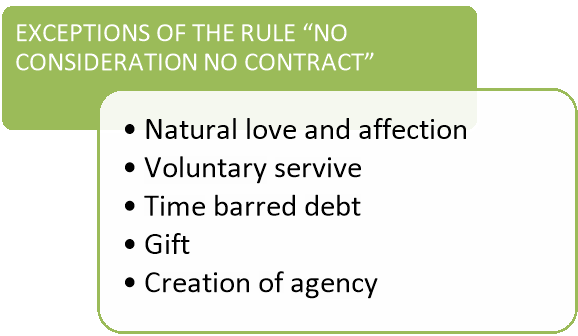
Figure: Exceptions to the rule no consideration no contract
- On account of natural love & affection u/s 25(1):
If an agreement is in writing and registered between two parties in close relation (like blood relatives or spouse), based on natural love and affection, then such an agreement is enforceable even without consideration. For example, Father transfers the ownership of property to his son
2. For voluntary services u/s 25(2):
If a person has done a voluntary service in the past and the beneficiary promises to pay at a later date, then the contract is binding provided:
- The service was rendered voluntarily in the past
- It was rendered to the promisor
- The promisor was in existence when the voluntary service was done (especially important when the promisor is an organization)
- The promisor showed his willingness to compensate the voluntary service
For example, X finds Y’s wallet on the road and returns it to him. Y is happy to find his lost wallet and promises to pay X Rs 2,000.
3. For promise to pay time-barred debts 25(3):
If a person makes a promise in writing signed by him or his authorized agent about paying a time-barred debt, then it is valid despite there being no consideration. The promise can be made to pay the debt wholly or in part. Example, X owes Rs 100,000 to Y. X had borrowed the money 5 years ago. However, X never paid a single rupee back. X signs a written promise to pay Rs 50,000 to Y as a final settlement of the loan.
4. Within the case of completed gifts:
The rule of no consideration no contract does not apply to gifts. Explanation (1) to Section 25 of the Indian Contract Act, 1872 states that the rule of an agreement without consideration being void does not apply to gifts made by a donor and accepted by a donee.
5. Creation of an Agency
According to section 185 of the Indian Contract Act, 1872, no consideration is necessary to create an agency.
Unlawful consideration (as per section 23)
According to Section 23, within the following cases consideration or object of an agreement is unlawful:
1. If it's forbidden by law:
Where the object of a contract is forbidden by law, the agreement shall be void. An act is claimed to be forbidden if it's punishable by criminal law or any special statute, or if it's prohibited by any law or order made in exercise of powers or authority conferred by the legislature.
Example:
(1) A and B agreed to deal in smuggled goods. It forbidden by law and thus void.
(2) A committed B's murder within the presence of C. A promise to pay Rs. 500 to C, if C doesn't inform the police about the murder.
The agreement in example No. 2 given above is against the law as its object is unlawful. Besides, A and C are going to be responsible for the act of murder and its concealment under the Indian penal code.
2. If it's of such a nature that if permitted, it might defeat the provisions of the other law:
The object of an agreement might not be directly forbidden but indirectly, it's going to defeat the thing of any other law, and the agreement would be void in such a case.
Example: A failed to pay his land revenue. Therefore, his estate was sold for arrears of revenue by the govt. By the law, the defaulter is prohibited from purchasing the land again. A asks B to get the estate and afterward, transfer an equivalent to him at an equivalent price. The agreement is void because it will defeat the thing of the law which prohibits a defaulter to get back the land, for indirectly A will again become the owner of the estate.
3. If it's fraudulent:
If the object of an agreement is fraudulent, i.e., to cheat people, it's void. Example: A, B & C enter into an agreement to sell bogus plots of land in Delhi. The agreement is void because it is fraudulent and thereby unlawful.
4.If it involves or implies injury to the person or property of another:
Law protects property and person of its citizens. It cannot permit any contract which ends up in an injury to the person or property of any one. Examples: A promises to pay Rs. 500 to B if B beats C. It involves injury to C, hence it's unlawful and void.
5. If the Court regards it as immoral or against public policy:
If the thing of an agreement is immoral or against public policy, it will be void. Morality here means something which the law regards as immoral.
Examples: a) A agrees to offer his house on rent to a prostitute for her immoral purpose. A cannot recover the rent of his house if he prostitute refuse to pay. However, he could also be allowed to urge his house vacated from the prostitute because it will put an end to the immoral purposes.
b) A agrees to offer his daughter on hire to B for concubines. The agreement is void because it's immoral, though the letting might not be punishable under the Indian penal code.
Effect of Illegality
The effect of illegality are discussed below-
1. An illegal agreement is void:
It is not enforceable at law.
2. Collateral transactions to illegal transactions also are void:
Not only the illegal agreement is void but also the collateral transactions are void.
Example: A borrows Rs. 2,000 from B to shop for a revolver to shoot C. Since the thing of the transaction is against the law, B cannot recover his Rs. 2,000 if he has given the loan, knowing that A is taking the loan to get a revolver to shoot C.
Thus people are going to be discouraged to finance or assist illegal transaction once they know that they're going to not be able to recover their loans.
3. Law doesn't help any party:
Where the agreement is against the law, the law won't help any of the parties. The rationale is that both the parties are equally guilty and therefore the law doesn't help a guilty person. The law wants to discourage both the parties. Example: A promise to pay a bribe of Rs. 200 to B, if B does his work. The agreement is against the law. B cannot recover the amount of Rs. 200 after doing A's work. Similarly, if A has paid the bribe in advance, he cannot get it back if B doesn't do his work.
4. Indirectly defendant is helped:
Defendant may be a person against whom the suit is filed. When the law doesn't help any of the parties, it means the party who has paid the amount won't be ready to get it back as we've seen within the above example. The party who has received the quantity is thus helped to stay the money with it and isn't asked by the Court to return it. The Court is neutral and therefore the defendant gets the advantage of the Court's neutrality. Within the example given above, B can keep Rs. 200, even if B doesn't do the work of A. The Court won't ask B to return the quantity. Thus B is indirectly benefited or helped by the refusal of the Court to intervene.
5. In cases of fraud, coercion, etc., money or property transferred is often recovered:
Where the illegality is that the results of coercion and fraud of the other party, the Court can compel the guilty to return the cash paid or property transferred.
6. Agreement partly legal and partly illegal (Sec. 24):
An agreement may contain promises which are legal and illegal. If the legal promise are often separated from the illegal one, the legal promise are often enforced. In Such a case the illegal part are going to be void. Where the legal promise can't be separated from the illegal one, the entire of it might be void. Where there's one consideration for one or more unlawful objects, the agreement is void. Example: A promises to manage B's factory, where genuine and bogus motor parts are manufactured. B agrees to pay A (Manager) a salary of Rs. 1,000 per month. The agreement is void as partly it's legal and illegal and therefore the legal part can't be separated because the salary is for both the parts.
7. Reciprocal promises, legal and illegal (Sec. 57):
Where persons reciprocally promise, firstly to do certain things which are legal, and secondly under specified circumstances to do certain other things which are illegal, the first set of promise may be a contract, but the second may be a void agreement. Example: A and B agree that A shall sell a house to B for Rs. 10,000 but that if B uses it as a gambling house, he shall pay A Rs. 50,000 for it. The first set of promise, i.e., to sell the house and to pay Rs. 10,000 may be a contract. The second set of promise, i.e., B may use the house as a gambling house and pay Rs. 50,000 may be a void agreement.
8. Alternative promise, legal and illegal (Sec. 58):
In the case of an alternate promise, one branch of which is legal and therefore the other illegal, the legal branch alone are often enforced.
Void Agreements
Void Contract means a contract doesn't exist in any respect. The law can't enforce any legal obligation to either party especially the disappointed party because they are not entitled to any protective laws as far as contracts are concerned. An agreement to carry out an illegal act is an example of a void contract or void agreement. Example: Contract between drug dealers and buyers could also be a void contract simply because the terms of the contract are illegal. In such a case, neither party can move to court to enforce the contract.
As per Section 2(g) of The Indian Contract Act, 1872 “An agreement not enforceable by law is claimed to be void”, and as per Section 2(j) of The Act “A Contract which ceases to be enforceable by law becomes void when it ceases to be enforceable”
Thus Void Contracts are often of following two types:-
- Void ab initio: - void-ab-initio i.e. unenforceable from the very beginning
- Void due to the impossibility of its performance: A contract can also be void due to the impossibility of its performance. E g: If a contract is formed between two parties A & B but during the performance of the contract the thing of the contract becomes impossible to achieve (due to action by someone or something apart from the contracting parties), then the contract cannot be enforced within the court of law and is thus void.

Figure: Types of void contract
Void agreements as per the provisions of Indian contract act, 1872
The provisions related to void agreement under the Indian Contract Act are discussed below-
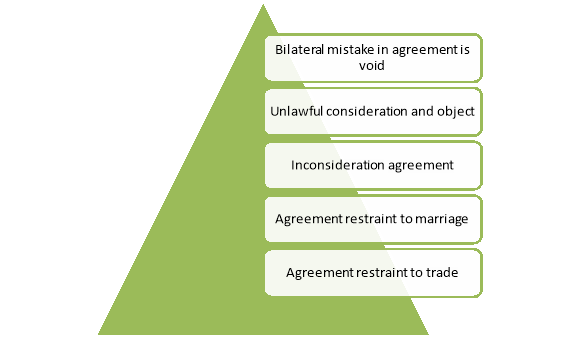
Figure: Provisions related to void agreement
1. Any agreement with a bilateral mistake is void (Section 20):-
Where both the parties to an agreement are under a mistake on matter of fact essential to agreement, the agreement is void, for ex. A agrees to shop for from B a specific horse. It seems that the horse was dead at the time of the discount, though neither party was aware of the particular fact. The agreement is void.
But a contract isn't voidable merely because it had been caused by one of the parties thereto being under a mistake on a matter of fact. (Section 22)
2. Agreements which have unlawful consideration and objects are void (section 23 & 24):
The consideration or object of an agreement is unlawful if it's forbidden by law or of such a nature that if permitted, it'd defeat the provisions of any law or is fraudulent or involves injury to the person or property of another or court regards it as immoral or against public policy. If any a neighborhood of one consideration for one or more objects, or anybody or any a neighborhood of anybody of several consideration for one object, is unlawful, the agreement is void. But where the legal a neighborhood of an agreement is severable from the illegal, the previous would be enforced.
3. Agreements made inconsiderately is void (Section 25):
An agreement without the consideration is void unless:
- It's made on account of natural love and affection and it's expressed in writing and registered under the law for the nonce in effect.
- It's a promise to compensate, a private who has already voluntarily done something for the promisor.
- It's a promise to pay a time barred debt.
4. Agreement restraint to marriage of any major person is void (Section 26):
Every agreement in check of the marriage of an individual, apart from a minor is void. It’s the policy of the law to discourage agreements which restrains freedom of marriage. The restraint could even be general or partial, that's to say, the party could even be restrained from marrying within the least, or from marrying for a hard and fast time or from marrying a selected person or class of persons, the agreement is void.
5. Agreement restraint to trade is void. (Section 27):
Every agreement by which anyone is restrained from exercising a lawful profession, or trade or business of any kind, is thereto extent void. There are two kinds of exception to the rule, those created by Statutes
- Sale of Goodwill: he only exception mentioned within the provision to section 27 is that regarding sale of goodwill. It states that “One who sells the goodwill of the business may accept as true with the customer to refrain from carrying on the same business, within specified local limits, so long because the buyer, or an individual deriving the title to the goodwill from him, carries on a like business therein: as long intrinsically limits appear to the court reasonable, regard being had to the character of the business.
- Partnership Act: There are four provisions within the Partnership Act which validate agreements in restraint of trade. Section 11 enables partners during the continuance of the firm to limit their mutual liberty by agreeing that none of them shall keep it up any business apart from that of the firm. Section 36 enables them to restrain an outgoing partner from carrying on an equivalent business within a specified period or within specific local limits. An equivalent agreement could even be made by partners upon or I anticipation of dissolution.
Exception to the rule as per judicial interpretation:
Exclusive Dealing Agreements: Business practice hip is that a producer or manufacturer likes to market his goods through a sole agent or distributor and thus the latter agrees successively to not affect the products of the opposite manufacturer.
Restraints upon Employee: An agreement of service often contain negative covenants preventing the worker from working elsewhere during the amount covered by the agreement. Trade Secrets, name of consumers etc. are also the property of master and servant isn't imagined to disclose it to anyone else. An agreement of this class doesn't falls within Section 27.
- Agreement in check of legal proceedings is void. (Section 28):
An agreement purporting to oust the jurisdiction of the courts is against the law and void on grounds of public policy. Section 28 of the Act renders void two sorts of agreement, namely:
- An agreement by which a party is restricted absolutely from enforcing his legal rights arising under a contract by the quality legal proceedings within the ordinary tribunals.
- An agreement which limits the time within which the contract rights could even be enforced
However this is often also not an absolute rule and it's two exceptions thereto which is as follows:-
This section shall not render illegal a contract , by which two or more persons agree that any dispute which may arise between them in respect of any subject or class of subjects shall be mentioned arbitration , which only the quantity awarded in such arbitration shall be recoverable in respect of the dispute so referred. Nor shall this section render illegal any accept writing, by which two or more persons suits arbitration any question between them which has already arisen, or affect any provision of any law effective for the nonce on references to arbitration. But right to Appeal doesn't come within the purview of this section. A celebration to a suit may comply with not appeal against the selection.
2. An agreement the terms of which are uncertain is void. (Section 29):
Agreements, the meaning of which isn't certain, or capable of being made certain, are void. It is a necessary requirement that an agreement so as to be binding must be sufficiently definite to enable the court to supply it a practical meaning. An agreement to agree within the longer term is void, for there is no certainty whether the parties will be able to agree. Where only a neighborhood or a clause of the contract is uncertain, but the remainder is capable of bearing a reasonably certain meaning, the contract are getting to be considered. Similarly, if the agreement is totally silent on price, it'll be valid, for, therein case, Section 9 of the Sale of products Act,1930 will apply and reasonable price shall be payable.
3. An agreement by way of wager (betting/gambling) is void. (Section 30):
Agreements by way of wager are void; and no suit shall be brought for recovering anything imagined to be won on any wager or entrusted to an individual to abide by the results of any game or other uncertain event on which any wager is made. The section doesn't define “Wager”. But wager are often said as a promise to supply money or money’s worth upon the determination or ascertainment of an uncertain event.
This rule has two exceptions thereto, which is as follows:-
- Horse Race:- This section doesn't render void a subscription or contribution, or an agreement to subscribe or contribute, towards any plate , prize or sum of money of the worth or amount of 500 Rs. Or upwards to the winner or winners of any horse races.
- Crossword Competitions & Lottery: - If skill plays a substantial part within the result and prizes are awarded according to the merits of the solution, the competition isn't a lottery. Otherwise it’s. Thus, literary competitions which involve the applying of skill and within which an effort is formed to select the simplest and most skillful competitor, aren't wagers.
Discharge of contract
Discharge of a contract implies termination of contractual obligations. This is often actually because when the parties originally entered into the contract, the rights and duties in terms of contractual obligations were found out. Consequently when those rights and duties are put out then the contract is claimed to possess been discharged. Once a contract stands discharged, parties thereto are not any more liable albeit the obligations under the contract remain incomplete. A Contract is deemed to be discharged, that is, concluded and not binding, within the subsequent circumstances:
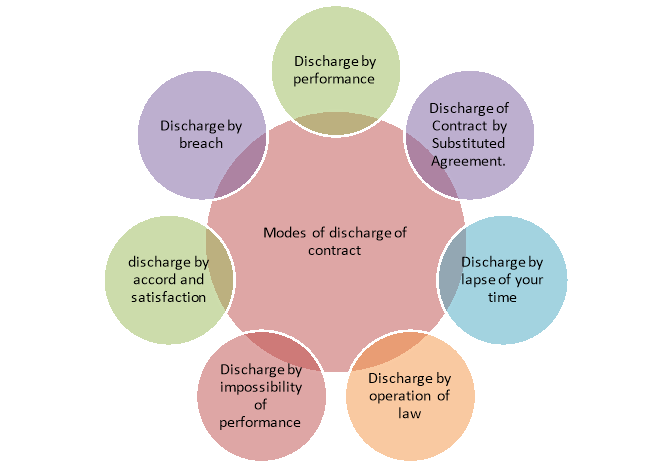
Figure: Modes of discharge of contract
- Discharge by performance
Where both the parties have either carried out or tendered (attempted) to carry out their obligations under the contract, is mentioned as discharge of the contract by performance. Because performance by one party constitutes the occurrence of a constructive condition, the other party’s duty to perform is additionally triggered, and thus the one that has performed has the proper to receive the other party’s performance. The overwhelming majority of contracts are discharged during this manner.
2. Discharge of Contract by Substituted Agreement
A contract emanates from an agreement between the parties. It thus follows that, the contract must even be discharged by agreement. Therefore, what's required, inevitably, is mutuality. Discharge by substituted agreement arises when a contract is abandoned, or the terms within it are altered, and both the parties are in conformity over it.
For example, A and B enter into some agreement, and A wants to change his mind and to not perform his terms of the contract. If he does this unilaterally then he are getting to be in breach of contract to B. However, if he approaches B and states that he would adore to be released from his liabilities under the contract then the latter might agree. Therein case the contract is claimed to be discharged by (bilateral) agreement. In effect B has promised to not sue A if he doesn't perform his a neighborhood of the contract and thus the consideration for his promise could also be a‘s promise to not sue B. Discharge by agreement may arise within the subsequent ways.
- Novation: The term novation implies the substitution of a fresh contract for the first one. This arrangement could even be either with the same parties or with different parties. For a novation to be valid and effective, the consent of all the parties, including the new one(s), if any, is vital. Moreover, subsequent or second agreement must be one capable of enforcement in law, the consideration that is that the exchange of promises to not enforce the first contract.
- Rescission: This refers to cancellation of all or few the fabric terms of the contract. If the contracting parties mutually decide to do so, the respective contractual obligations of the parties stand terminated.
- Alteration: This refers to a change in one or more of the terms of a contract with the consent of all the contracting parties. Alteration results in a replacement contract but parties thereto remain the same. Here the assumption is that both the parties are to understand a fresh but different enjoy the new agreement. Remission this means the acceptance (by the promisee) of a lesser sum than what was contracted for, or a lesser fulfillment of the promise made. As per Section 63, ‘every promisee may (a) remit or dispense with it, wholly or partially, or (b) extend the time of performance, or (c) accept the opposite satisfaction instead of performance’.
- Waiver: The term waiver implies abandonment or relinquishment of a right. Where a party deliberately abandons its rights under the contract, the other party is released of its obligations, otherwise binding upon it.
3. Discharge by lapse of your time
A contract stands discharged if not enforced within a specified period called the ‘period of limitation‘. The Limitation Act, 1963 prescribes the duration of limitation for various contracts. As an example , period of limitation for exercising right to recover an immovable property is twelve years, and right to recover a debt is three years. Contractual rights become time barred after the expiry of this limitation period. Accordingly, if a debt isn't recovered within three years of its payment becoming due, the debt ceases to be payable and is discharged by lapse of your time.
4. Discharge by Impossibility of Performance
Sometimes after a contract has been established, something might occur, though not at the fault of either party, which can render the contract impossible to perform, or illegal, or radically different from that originally undertaken. However, if whatever happens to prevent the contract from being performe has not been caused by either party couldn't are foreseen, and its effect is to destroy the thought of the contract then the courts will, generality, state that the contract has become impossible to perform. If that happens then the contract is discharged and neither party will have any liability there under Section 56 of the Indian Contract Act clearly provides that an agreement to undertake to an act impossible in itself is void. The performance of a contractual obligation may become subsequently impossible on sort of grounds.
They include the next
• Objective impossibility of performance
• Commercial impracticability
• Frustration of purpose
• Temporary impossibility
5. Discharge of operation of law
A contract stands discharged by operation of law within the subsequent circumstances. A party can treat a contract discharged (i.e., from his side) if the other party alters a term (such as quantity or price) of the contract without seeking the consent of the previous.
- Statutes of Limitations
A contract stands discharged if not enforced within a specified period called the ‘period of limitation’. The Limitation Act, 1963 prescribes the duration of limitation for various contracts. As an example , limitation period for exercising right to recover an immovable property is twelve years and right to recover a debt is three years. Contractual rights become time barred after the expiry of this limitation period. Accordingly, if a debt isn't recovered within three years of its payment becoming due, the debt ceases to be payable and is discharged by lapse of your time.
- Insolvency
A discharge in bankruptcy will ordinarily bar enforcement of most of a debtor’s contracts.
- Merger
A contract also stands discharged through a merger that happens when an inferior right accruing to party during a contract amalgamates into the superior right ensuing to an equivalent party. As an example, A hires a factory premises from B for a couple of manufacturing activity for a year, but 3 months before the expiry of lease purchases that very premises. Now since A has become the owner of the building, his rights associated with the lease (inferior rights) subsequently merge into the rights of ownership (superior rights). The previous rental contract ceases to exist.
6. Discharge by Accord and Satisfaction
To discharge a contract by accord and satisfaction; the parties must suits accept performance that's different from the performance originally promised. It's getting to be studied under the next sub-heads.
7. Accord
An accord is an executor contract to perform an act which can satisfy an existing duty. An accord suspends, but doesn't discharge, the primary contract.
8. Satisfaction
Satisfaction is that the performance of the accord, which discharges the primary contractual obligation. If the obligator refuses to perform, the obligate can sue on the primary obligation or seek a decree for performance on the accord.
KEY TAKEAWAYS
- WHILE THE LAW ALLOWS THE PARTIES TO DECIDE AN ‘ADEQUATE’ CONSIDERATION FOR THEM, IT MUST BE REAL AND HAVE VALUE IN THE EYES OF LAW. WHILE THE COURT WILL NOT CONSIDER INADEQUACY, IT WILL LOOK AT IT TO DETERMINE IF THE CONSENT WAS GIVEN BY THE PARTY WITH FREE-WILL OR NOT.
Performance of a contract is the fulfilment of the contractual obligations by the parties. It is one of the methods to discharge a contract. The term “Performance of contract” means that both, the promisor and the promisee have fulfilled their respective obligations, which the contract placed upon them. For instance, A visits a stationery shop to buy a calculator. The shopkeeper delivers the calculator and A pays the price. The contract is said to have been discharged by mutual performance.

Types of Performance
Performance, as an action of the performing may be actual or attempted. Such types are discussed below-

Figure: Types of performance
- Actual Performance
When a promisor to a contract has fulfilled his obligation in accordance with the terms of the contract, the promise is said to have been actually performed. Actual performance gives a discharge to the contract and the liability of the promisor ceases to exist. For example, A agrees to deliver10 bags of cement at B’s factory and B promises to pay the price on delivery. A delivers the cement on the due date and B makes the payment. This is actual performance. Actual performance can further be subdivided into substantial performance, and partial Performance
2. Substantial Performance
This is where the work agreed upon is almost finished. The court then orders that the money must be paid, but deducts the amount needed to correct minor existing defect. Substantial performance is applicable only if the contract is not an entire contract and is severable. The rationale behind creating the doctrine of substantial performance is to avoid the possibility of one party evading his liabilities by claiming that the contract has not been completely performed. However, what is deemed to be substantial performance is a question of fact to be decided in both the case. It will largely depend on what remains undone and its value in comparison to the contract as a whole.
3. Partial Performance
This is where one of the parties has performed the contract, but not completely, and the other side has shown willingness to accept the part performed. Partial performance may occur where there is shortfall on delivery of goods or where a service is not fully carried out.
Breach of contract
A contract is breached or broken when any of the parties fails or refuses to perform its promise under the contract. Breach of contract is a legal cause of action in which a binding agreement is not honoured by one or more parties by non-performance of its promise by him renders impossible.
Section 37 of the Indian Contract Act,1872 provides that the parties to the contract are under obligation to perform or offer to perform, their respective promises under the contract, unless such performance is dispensed with or excused under the provisions of the Indian Contract Act or of any other law.
Types of Breach of Contract
Different types of breach of contract are discussed below-
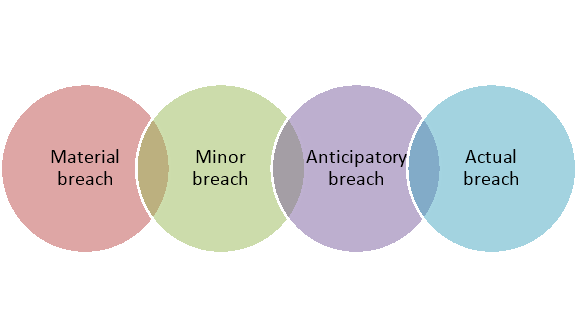
Figure: Different types of breach of contract
1. Material breach of contract:
Material breach of contract happens when a key element of a contract doesn’t get fulfilled as agreed. It defeats the purpose of agreement. In this case, mostly the aggrieved party goes to the court and tries to collect damages caused by the breach.
For example: (1) If you went to buy the computer, but you received only the monitor. It will be considered as a breach of contract and you will be entitled to take a legal action.
(2) You entered a contract with a media house to publish the article about the recently held event, but they failed to do so. Then, it will be considered as a breach of contract.
2. Minor breach of contract: A minor breach, also known as a partial breach or an immaterial breach where the important aspects of a contract were received, however the small part of obligations remained missed. In such a case, the suffering party can prove that they are able to pursue a legal remedy if they can prove that the breach has resulted in a financial loss.
For example: (1) If a website developer was asked to build a website, but he skipped the page of the team. Then, this will be considered as a minor breach, because nothing significant like - company details, testimonials etc. have been skipped.
(2) A shipment of goods got late. In this case also, there can be no legal remedy unless one could show how the delay caused a financial loss.
(3) Anticipatory breach of contract: An anticipatory breach of contract happens when the breaching party notifies the other party that it will not be able to fulfill their obligations by the agreed time.
For example: (1) An interior designer finds that it is impossible to meet a deadline, hence stop the work and invest all his/her resourced into a new project. The party can take a legal action against the architects.
(2) If a person receives an internet connection of monthly services, but the recipient says that he/she won’t be paying for a particular month, but still expects the services. It would lead to an anticipatory breach of contract.
(4) Actual breach of contract: An actual breach of contract happens when a person fails to meet the certain obligations stated in a contract complying with authoritative time constraints to finish non-performance.
For example: (1) Shyam enters in a contract with Ram and promises that he will deliver 30 bags of cotton on 12th February 2021. But on the scheduled day, he fails to deliver the same. This is an actual breach of contract.
(2) Peter enters into a contract with John and promises that he will sing every Saturday and Sunday on his club for 1 hour during next four months in the exchange of Rs. 5,000. However, on the 4th night, he didn’t turn up. This is an actual breach of contract on the part of Peter.
Remedies (Including damages, meaning, kinds and rules for ascertaining damages)
A legal remedy may be a writ that seeks to uphold a person’s rights or to redress a breach of the law. When one party breaches a contract, the opposite party may ask a court to supply a remedy for the breach. The court may order the breaching party to pay money to the non-breaching party.
TYPES OF REMEDIES

Figure: Remedies for breach of contract
- SUIT FOR RESCISSION
The term Rescission refers to the cancellation of contract. In such cases, if one party has broken his contractual relations, the opposite party may treat the breach as discharge and refuse to perform his a part of performance. Thus just in case of rescission of contract, the aggrieved or casualty is discharged from all his obligations of the contract. Under following cases the court may refuse to grant rescission:
• The parties can't be restored to their original positions thanks to changed circumstances.
• The party(s) has acquired rights in straightness and value during subsistence of contract.
• Only a neighborhood of the contract is rescinded and this part can’t be separated from remainder of the contract.
• But if an individual rightfully rescinded, he's entitled to compensation for any damage which he has sustained through non fulfillment of the contract by the opposite party.
EXAMPLE:
'A' contracts to provide 10kg of tea leaves for Rs. 8,000 to 'B' on 15 June. If 'A' doesn't supply the tea leaves on the appointed day, 'B' needn't pay the worth. 'B' may treat the contract as rescinded and should sit quietly reception. 'B' can also file a ‘suit for rescission’ and claim damages. 12 A B Breach of contract when ‘A’ don’t supply to ‘B
2. SUIT FOR DAMAGES
Damages are a monetary compensation allowed to the casualty for the loss or injury suffered by him as a result of the breach of contract. The elemental principle underlying damages isn't punishment but to compensate the aggrieved party for the loss suffered by him within the original position as he would be.
Rules regarding damages
• The damages must naturally arise within the usual course of things from such breach i.e. the damages must be the proximate or direct consequence of the breach of contract.
• The aggrieved party must have suffered damages by breach of contract.
• Damages are awarded to compensate the loss caused by a celebration but to not punish the party at default for the breach of contract.
• Amount of damages are often decided at the time of agreement by the mutual consent of both the parties.
Types of damages
• Ordinary
• Special
• Exemplary
• Nominal damages
• Damages for inconvenience and discomfort
• Liquidated damages and penalty
• Stipulation for interest
• Forfeiture of margin there are 8 sorts of damages
EXAMPLE: Mr. A to pay 3 lac to Mr.B on 1st April. Mr.A doesn't pay the cash thereon day. Mr. B is unable to pay her debts and suffer a loss. Mr. A is susceptible to pay B principal amount and also interest thereon. 16 A B Breach of contract when ‘A’ don’t give money to ‘B’. Payable money
3. Suit for quantum meruit
It means “AS much as EARNED” or “in proportion to the work done.” Right to ‘Quantum Meruit’ literally means a right to say the compensation for the work already done. Example, Mr.A engages Mr.B a contractor, to create a 3 storied house. After a neighborhood is made ‘A’ prevents ‘B’ from working any longer. ‘B’ the contractor, is entitled to urge reasonable compensation for work done under the doctrine of quantum merit additionally to the damages for breach of contract. 18 Breach of contract when ‘A’ told ‘B’ to prevent building construction.
4. Suit for performance
Suit for performance means demanding the court’s direction to the defaulting party to hold out the promise consistent with the terms of contract. Cases where suit for performance isn't maintainable
i. Where compensatory damages arising from breach aren't measurable
Ii. Where monetary compensation isn't an adequate remedy.
Example: X agreed to sell an old painting to Y for Rs50,000. Subsequently, X refused to sell the painting. Here, Y may file a suit against X for the precise performance of the contract.
5. Suit for injection
It means demanding court’s stay order. An order of the court which prohibits an individual to try to to a specific act. A party to a contract does something which he presumed to not do, the court may issue an order prohibiting him from doing so. EXAMPLES: A, a singer contracts with B the Manager of a theatre to Sing at his theatre for one year and to abstain from Singing at other theatres during the theatre. She absents herself, B cannot compel A to sing at his theatre, but he may sue her for an injunction restraining her from Singing at other theatres.
G agreed to require the entire of his supply of electricity from a particular company. The agreement was held to import a negative promise that he would take none from elsewhere. He was, therefore, restrained by an injunction from buying electricity from the other company.
KEY TAKEAWAYS
- PERFORMANCE OF A CONTRACT IS THE FULFILMENT OF THE CONTRACTUAL OBLIGATIONS BY THE PARTIES. IT IS ONE OF THE METHODS TO DISCHARGE A CONTRACT. THE TERM “PERFORMANCE OF CONTRACT” MEANS THAT BOTH, THE PROMISOR AND THE PROMISEE HAVE FULFILLED THEIR RESPECTIVE OBLIGATIONS, WHICH THE CONTRACT PLACED UPON THEM.
Case studies
- Agreement – AGC (Advances Ltd) vs McWhirter, Supreme Court of NSW (1977) 1 BLR 9454
This case relates to the first requirement of any legally binding contract, agreement. In this case, the plaintiff had put up a property for sale at auction, subject to a reserve. The defendant made a bid of $75,000 which was the highest bid. When this bid was not accepted by the plaintiff (based on concerns over the defendants ability to pay), the defendant claimed a legally binding contract had been entered when they made the highest bid.
In this case, the court ruled that bidders at auctions are entitled to make offers, but that offer does not need to be accepted by the seller. Therefore, auctions act as an invitation to treat. This means that agreement was not reached, as the seller refused the bidder’s offer. Therefore a legally enforceable contract was not entered in this case on the basis of lack of agreement.
2. Capacity – Blomley vs Ryan (1956) 99 CLR 362
This case involved the sale of a farm by Ryan to Blomley. At the time the contract was entered, Ryan was suffering from prolonged and excessive alcoholism. Blomley knew this but went ahead with the contract. Ryan tried to call off the sale but Blomley took him to court, seeking specific performance (an order from the court to carry out the contract).
In this case, it was found that Blomley was aware of Ryan’s persistence problem with alcoholism, and the court noted that Ryan was ‘seriously affected by drink’ when the contract was entered. It was subsequently found that Ryan therefore lacked the capacity to enter a legally binding contract in this case, especially seeing as Blomley was aware of Ryan’s impairment and sought to benefit from it.
3. Intention to create legal relations – Air Great Lakes Pty Ltd vs KS Easter (Holdings) Pty Ltd, Supreme Court of NSW (1989) 2 NSWLR 309
This case involved the proposed sale of an airline to Easter by Air Great Lakes. Air Great Lakes claimed to have entered into a contract with Easter, which Easter subsequently refused to honour. Air Great Lakes sought damages from Easter, who claimed that they did not intend to create a legally binding agreement and that Air Great Lakes was aware of this. The court found that the contract was not to be imposed as Air Great Lakes was aware of the fact the Easter did not intend for the agreement to be legally binding.
The above cases illustrate the importance of contract law, in that misunderstandings in this area can have costly consequences. It is the obligation of parties to ensure that they are aware of what constitutes a legally binding agreement should they seek to enter an agreement that is enforceable. For this reason, it is advisable that anyone seeking to create an important or valuable contract should have that contract drafted or reviewed by a contract lawyer to ensure it is legally binding and able to be enforced.
References
1) Business and Corporate Law: - Dr. Kaur Harpreet, Lexis Nexis (2013)
2) Laws for Business, Sulphey M.M.&Basheer, PHI Learning Pvt. Ltd., Delhi. (2013)
3) Business Laws: - Kuchhal M.C.&KuchhalVivek, Vikas Publishing House (2013)
4) Business and Commercial Laws:-Sen And Mitra , The World Press Pvt. Ltd.(2018)